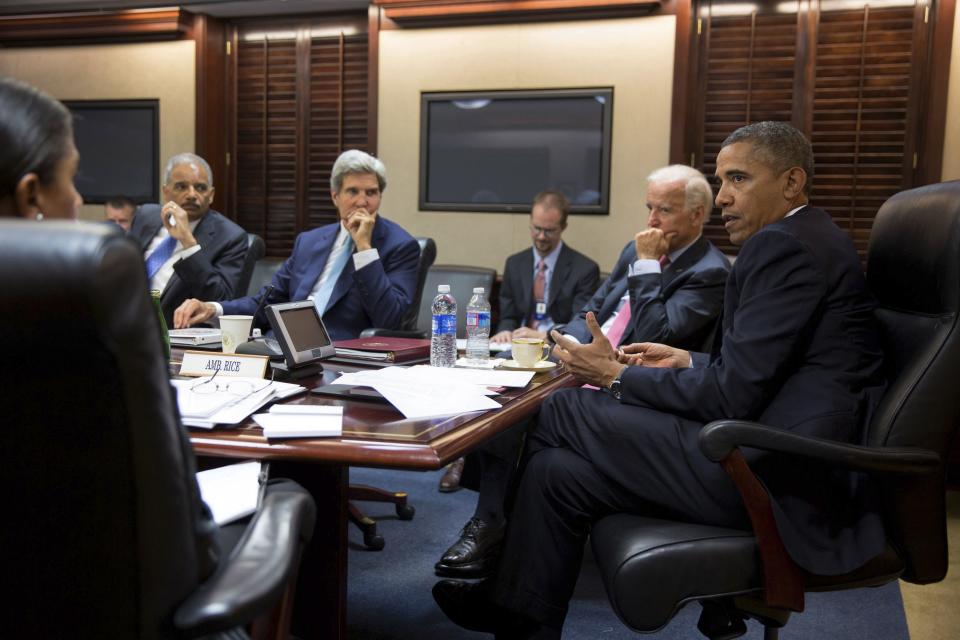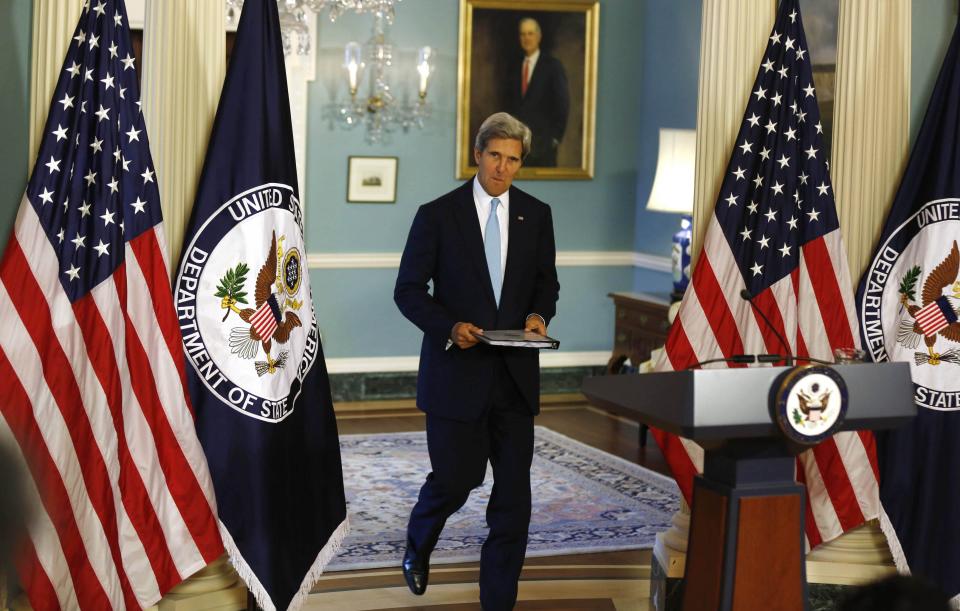Kerry: Sarin found in hair, blood samples from Syria
Secretary of State John Kerry said on Sunday that there is new evidence that Syrian President Bashar Assad's forces used sarin gas in an attack on its citizens, building the case for a U.S. strike.
"Bashar al-Assad now joins the list of Adolf Hitler and Saddam Hussein [who] have used these weapons in time of war," Kerry said on NBC's "Meet the Press," one of five Sunday morning talk shows on which the former Massachusetts senator appeared.
In the last 24 hours, Kerry said, the United States has obtained hair and blood samples from first responders in Damascus that tested positive for sarin signatures. "So this case is building, and this case will build," he said.
Kerry also defended President Barack Obama's decision to seek Congressional approval for a U.S. military strike on Syria and disputed reports that he and other top White House officials opposed the president's plan.
"No, I did not oppose going [to Congress], nor did anybody else that I know of originally," Kerry continued. "The issue originally was, 'Should the president of the United States take action in order to enforce the credibility and the interest of our country and to deter Assad from using these weapons and to degrade his capacity to do so?' That was the issue. And that's the issue that we debated. There was no decision not to do that. And the president has the right to do that, and we argued — not argued, discussed the options in the context of his right ... [to] take that action. The president then made the decision that he thought we would be stronger and the United States would act with greater moral authority and greater strength if we acted in a united way.
"He didn't think it was worthwhile acting and having the Syrians and a whole bunch of other folks looking at the United States arguing about whether or not it was legitimate or should he have done it or should he have moved faster," Kerry continued. "He believes we need to move, he's made his decision. Now it's up to the Congress of the United States to join him in affirming the international norm with respective enforcement against the use of campaign weapons."
Kerry's comments came a day after Obama announced Saturday his decision to launch military strikes against Syria — with Congress' seal of approval.
“In a world with many dangers, this menace must be confronted,” Obama declared in the Rose Garden 10 days after Assad’s forces allegedly massacred 1,400 civilians with chemical weapons. “After careful deliberation, I have decided that the United States should take military action against Syrian regime targets."
“I’m the president of the world’s oldest constitutional democracy," the president continued. "I will seek authorization for the use of force from the American people's representatives in Congress."
But such authorization may not come until Sept. 9, when Congress is scheduled to return from a monthlong vacation.
"I hope and pray it will be seen as careful deliberation, as appropriate exercise of American constitutional process," Kerry said Sunday. "The United States is strongest when the Congress speaks with the president, when the American people are invested, because we've had an appropriate vetting of all of the facts.
"The people of America should be celebrating that the president is not acting unilaterally," Kerry added.
"If you don't do it, you send a message of impunity," he said in an interview with CNN's "State of the Union."
The secretary sidestepped the question of what happens if Congress does not give Obama the authorization to strike Syria.
"Let me be very blunt," Kerry said on "Meet the Press." "I do not believe the Congress of the United States will turn its back on this moment. I think the interests that we have with respect to potential future confrontation, hopefully not, but the challenge of Iran, the challenges of the region, the challenge of standing up for and standing beside our ally Israel, helping to shore up Jordan, all of these things are very, very powerful interests. And I believe Congress will pass it. ... The president has the authority to act, but the Congress is going to do what's right here."
"We are not going to lose this vote," Kerry said on ABC's "This Week." "The case hasn't changed, and the case doesn't change at all. The rationale for a military response is as powerful today" as it has been.
Some in Congress don't think it's powerful enough.
"It think it's a mistake to get involved in a Syrian civil war," Kentucky Sen. Rand Paul said on "Meet the Press."
Paul said there is no evidence that a U.S. strike would halt Assad's access to chemical weapons. "I'm not sending my son, your son, or anybody else's son to fight for stalemate. You know, when we fight, we fight when we have to. But I see things on a very personal basis. I see a young John Kerry who went to war, and I wish he remembered more of how awful war is, and that it shouldn't be a desired outcome.
"Neither are chemical weapons, and they should absolutely be condemned," Paul continued." But I think the failure of the Obama administration has been we haven't engaged the Russians enough or the Chinese enough on this. And I think they were engaged. I think there's a possibility Assad could already be gone. The Russians have every reason to want to keep their influence in Syria."
"I certainly enter this debate as a skeptic," Connecticut Sen. Chris Murphy, a Democrat, said. "But I'm going to allow the administration to make its case this week."
Sen. John McCain criticized Obama's indecisiveness to act.
"When the president of the United States said that it was a red line, he didn't say that, 'It's a red line, and by the way, I'm going to have to seek the approval of Congress,'" McCain said on CBS' "Face the Nation." "He said it was a red line and the United States of America would act. That's a big difference."




